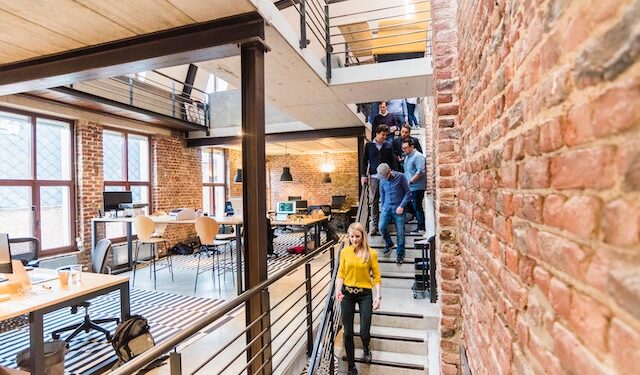
Even in the “Before Time”, Canadian business leaders were already being inundated with article after article urging them to prepare for the future of work.
Then, in March of 2020, that future hit – and it hit hard. The COVID-19 pandemic sent employees home with their laptops and monitors to work in makeshift offices. Teams adapted to Slack and Zoom and the work got done.
But even as productivity levels seemed to soar to new heights, cracks were developing in company culture and employee engagement. Employers who hadn’t been consciously working to keep their employees happy, safe and engaged found themselves at risk of losing them to companies that fostered a true sense of belonging.
Fast-forward to today and employees are making major career changes based on the return-to-the-workplace plans of their employers. Scanning Twitter or LinkedIn, leaders are now being advised on how to steer the ship through the Great Resignation.
Career mobility is now higher than at any time in recent history. Remote work has given employees a path to a real, liveable work-life balance. And every day that businesses put off the conversation on how to position their company and culture in this new world is a day closer to it being too late.
Great culture comes from meeting employees where they are. This is especially true as businesses announce return-to-the-workplace plans. The companies that seem to be the most successful with these plans are those that offer flexibility rather than a one-size-fits-all approach.
Companies such as Toronto-based Tulip Retail and Waterloo-based TextNow have empowered their employees to choose between working from home, working in the office or a true hybrid of the two. In doing so, employees get to keep the balance – and the company keeps the productivity – that they’ve found since the pandemic began.
Enlightened employers like these recognize that the old model of requiring everyone in the office for productivity was broken. We’ve realized that enduring a two-hour daily commute to sit in a few meetings isn’t necessary to do great work.
These plans also address the widespread normalization of remote work. If you were hired as a remote worker, that’s how your role will continue. Or, if you’re a local employee and there’s somewhere you want to move – to be closer to family or friends, or just get away from the city – the best employers are finding ways to make it work.
Before COVID, many employers – especially in technology – thought that the way to build culture was entirely through perks like ping-pong tables, catered lunches and free massages. The pandemic has proven that these “perks” – which all disappeared when employees moved to remote work – were just superficial attempts to build culture.
Those who tried to skate by without doing the real, hard work of building a strong, connected, sustainable corporate culture are now starting from scratch. The rapid onset of the future of work has given rise to a new collection of programs and tools to deliver intentional, thoughtful culture for businesses – culture-as-a-service or CaaS. It’s a potential US$300-billion-a-year industry that aims to foster real cultural connections in businesses from tech to finance and everything in between.
Building workplace culture is extremely labour intensive. Online collaboration tools can help keep people engaged and provide visibility into a company’s vision, objectives and performance – but they don’t build the authentic bridges between employees that strong cultures rely on.
As businesses get more and more comfortable with remote working and work from home, keeping those employees feeling just as valued as the people you get to see in the office every day is essential.
Cultivating those relationships that build culture across time zones and geographies means recognizing people for more than their work anniversaries and company milestones. Employees care about their lives outside of work and want to share birthdays, new pets, new homes and more with their colleagues. It’s those moments where strong connections are built. These connections are the cultural base for strong teams that work better together to deliver on company objectives.
Employees want more than branded hoodies or water bottles — they want recognition for the unique insights and effort they bring to your business. Companies that engage with their employees on a personal level are the ones that will succeed. They create strong personal relationships and augment them, no matter where their employees are.



